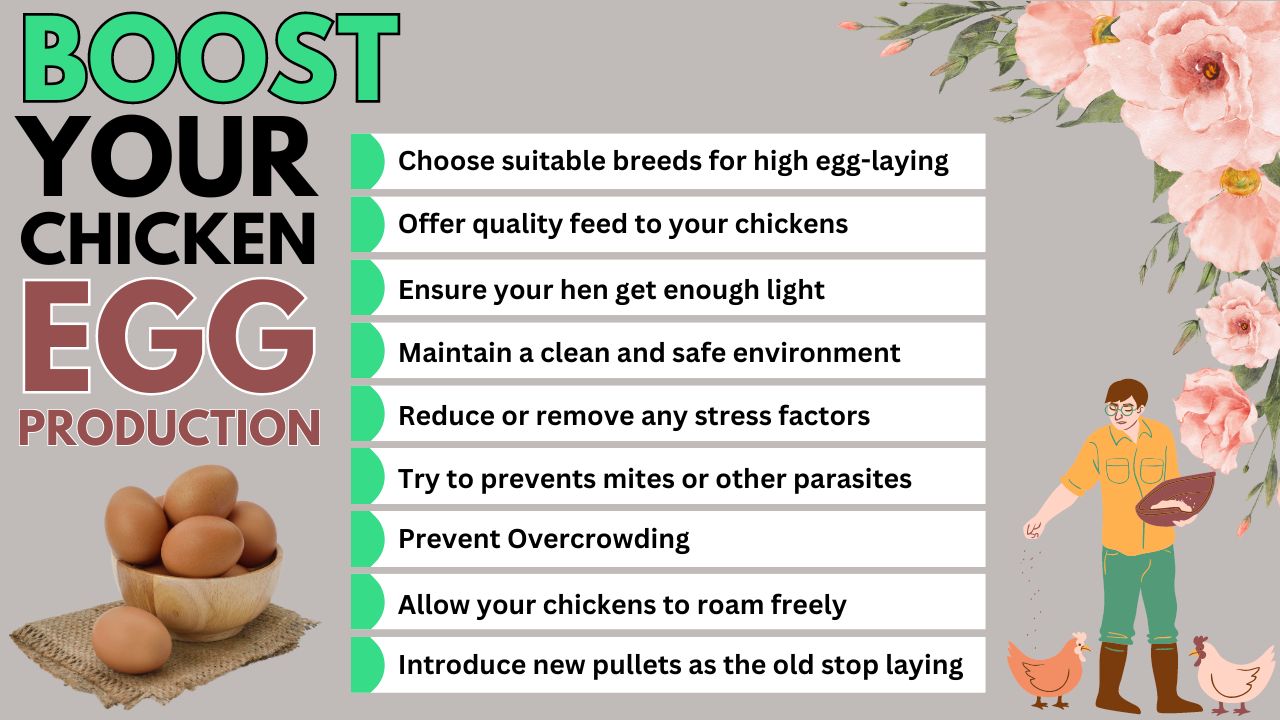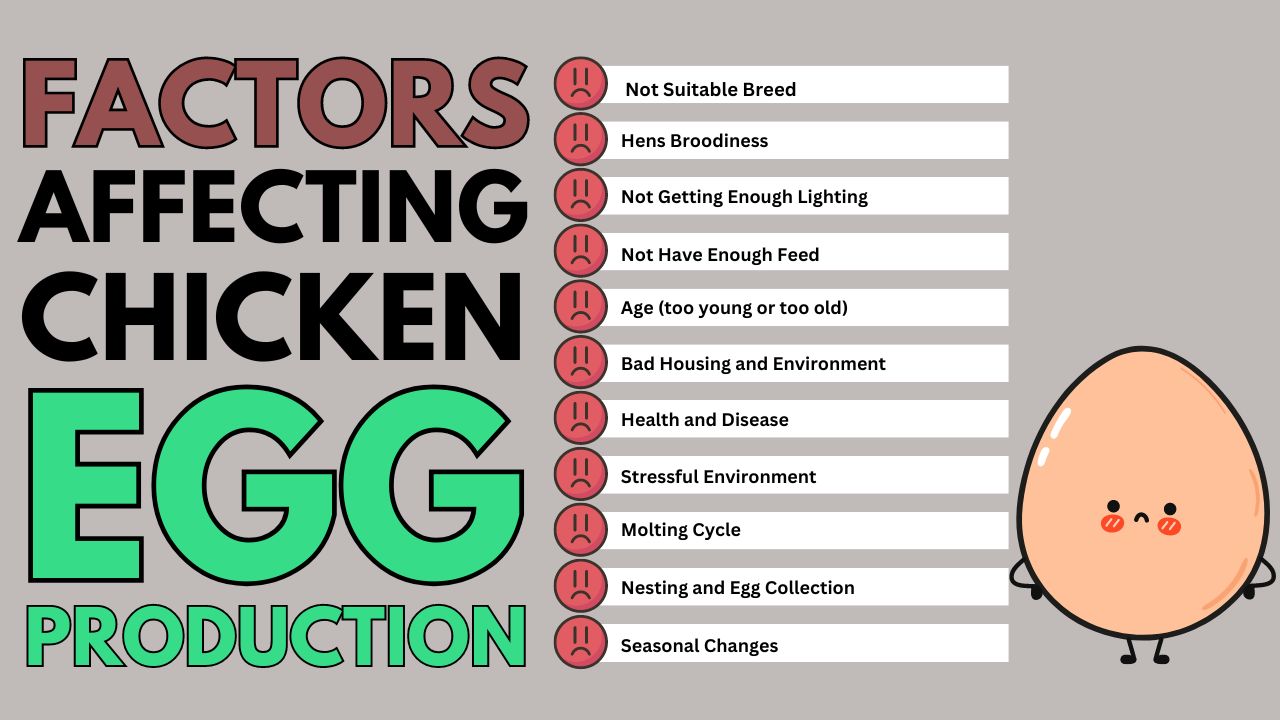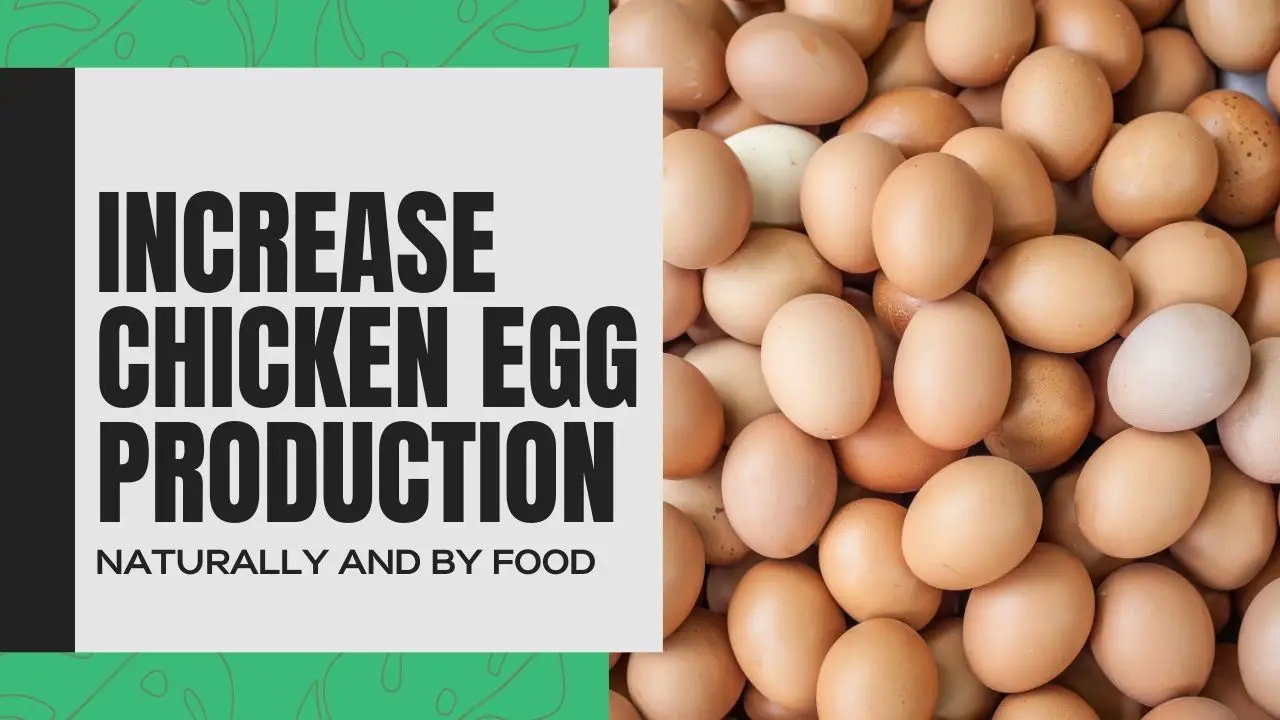Are you searching for or want to know how to increase chicken egg production? Whether a backyard chicken enthusiast or a large-scale farmer, you’ll always want more eggs for business or personal tables.
We will discuss various methods, such as foods like crushed oyster shells, herbs like fennel, and other natural methods, like light supplements, that can effectively boost chicken egg production. The best part is these methods will not impact your wallet.
Let’s turn your coop into an egg-laying powerhouse!
When Do Hens Start Laying Eggs?
Hens start laying eggs at around 5 to 6 months and can continue for 5 to 10 years. Peak production happens in the first two years of laying.
Most hens will lay an egg daily, as it takes 24 to 26 hours to create an egg and 14 to 16 hours of light daily to keep laying. It’s rare for a hen to lay more than one egg per day.
Several factors decrease egg production, including moulting (when chickens replace their feathers) and decreasing daylight hours.
How to increase chicken egg production easily
Increasing chicken egg production depends on many factors. To achieve high productivity, you must consider many factors and try new methods or stop using old ones.

- Age can affect egg production. Hens are most productive in their first 2 to 3 years of laying, then their egg production declines. Introduce new chicks or pullets to your flock to maintain a steady supply of eggs.
- To boost egg production in your chickens, the First step is to choose suitable breeds for high egg-laying ability, such as Leghorn, Hybrid, Rhode Island Reds, Australorp, Austrawhite, Bovans Brown, etc.
- Ensure your chickens get quality feed, such as crushed oyster shells for calcium and clean water. A balanced diet is critical for maximizing egg production.
- Chickens need about 14 to 16 hours of light daily to maintain high production. Ensure they get enough light from the sun or light bulb during shorter days.
- Always maintain a clean and safe environment for your chickens. Clean the coop regularly and provide fresh bedding to encourage your chickens to lay more eggs.
- Reduce or remove any stress factors. Stress can significantly reduce egg production, so ensure the hens are free from predators and other stressors like overcrowding.
- It’s also important to be vigilant against parasites. Maintaining a hygienic environment for your chickens prevents mites or other parasites that may affect their health and productivity.
- Overcrowding can increase stress and the risk of parasites like mites, so ensure your chickens have enough space to live comfortably.
- Free-ranging can improve chickens’ health and reduce stress, leading to more eggs. Always allow your chickens to roam free. If not possible, consider using chicken runs or tractors.
- Chicken egg production naturally decreases during molting, but providing high-protein and high-calcium feed can help the birds recover faster and return to laying.
Ultimately, the point is to keep your chickens happy and comfortable. The happier and more comfortable your chickens are, the more eggs they will lay.
The upcoming sections of the article discuss all these factors, along with some others, in detail.
How to get chickens to lay eggs for the first time
Getting chickens to lay eggs for the first time involves creating an optimal environment and ensuring their health and well-being.
- Proper nutrition, with layer feed full of protein and calcium, is the first thing to encourage your chicken to lay its first egg. Your chicken should also have access to clean, fresh water at all times, grit to aid digestion and an oyster shell for calcium.
- The second thing is to provide proper lighting; chickens need about 14-16 hours of light per day to stimulate egg production. During shorter days, use artificial lighting.
- Third, provide a comfortable coop with clean, comfortable, soft nesting boxes, ample space, and proper ventilation.
- Fourth, check your chicken for signs of illness and provide vaccinations if necessary. Also, look for mites and lice and treat them promptly.
- Fifth, always minimize or remove stress factors from your chicken’s environment, as stress can delay egg production.
- Sixth is encouraging your chicken by placing dummy eggs or golf balls in the nesting boxes to lay their first eggs.
- Considering the laying age of the hen is necessary, hens typically start laying eggs around 5 to 6 months, so be patient and allow them to mature naturally.
The first eggs might be unusual. They could be small, have soft shells, or contain no or double yolks. After about a week, the eggs should become more regular. The best egg-laying happens around 30 weeks of age.
How to increase chicken egg production in winter
Winter makes it harder to keep chickens laying eggs. When days get shorter and colder and daylight hours reduce, chickens will lay fewer eggs.
But there are some excellent ways to help your chickens keep laying eggs even when it’s cold:
- Let your chickens roam during daylight hours. Natural daylight helps their hormones stay active, and roaming gives them a chance to exercise, which improves egg production.
- Artificial lighting in their coop is a great way to help your chickens during shorter days. Put a light on a timer so your chickens get 14-16 hours of light each day. LED bulbs work well because they save energy and can mimic natural daylight.
- In winter, chickens need more energy to stay warm and lay eggs, so their food should be rich in protein and calcium. Use high-quality layer feed with extra vitamins and minerals to support their health.
- Scratch grains encourage natural feeding habits and add extra protein. They are not a replacement for regular feed but an easy way to boost protein intake.
- Maintaining coop conditions is crucial. Keeping the coop clean, ventilated, and warm is essential by using heat lamps or heated pads. Insulate the coop to keep in heat and stop drafts.
- Chickens always need fresh, unfrozen water. Use heated waterers to stop the water from freezing. Staying adequately hydrated is vital for their health and egg production.
- Keep your chickens’ environment calm. Predators, loud noises, and too much handling can stress them out and lower egg production. Ensure they feel safe and relaxed.
- Molting is when chickens lose old feathers and grow new ones. It usually happens in late summer or fall, and they might lay fewer eggs during this time. Extra protein is needed to help them grow new feathers and reduce stress.
How to get chickens to lay eggs again
A healthy hen will lay eggs regularly for the first two to three years. However, egg production can fluctuate or drop based on seasonal changes or other factors like age, diet, light, etc.
It is not easy to encourage your chicken to lay eggs again after they stop laying; however, a few things may encourage your hen to start laying again.
-
Offer a Balanced Diet
A balanced diet of 16-18% protein, calcium like limestone, vitamins like D3, and minerals like phosphorus is crucial for egg-making and laying.
Feed them extra protein in the morning and later in the day. Feeding the chickens extra protein twice a day helps encourage egg laying. Always provide clean and fresh water. Dehydration can lead to a drop in egg production.
-
Offer Supplements and Treats
While a commercial layer feed should provide all necessary nutrients, additional supplements, and treats can boost production. Greens and vegetables like leafy, carrots, and other vegetables can provide extra vitamins and minerals.
Also, provide mealworms as a treat, as they are rich in protein and can boost your chickens’ protein intake.
-
Managing Light Exposure
Let your chickens roam during daylight hours or expose them to more light. Light helps their hormones stay active, leading to high egg production.
Natural daylight may not be sufficient during the shorter days of winter, and implementing artificial lighting in the coop can help maintain a consistent laying pattern.
Ensure hens receive 14-16 hours of light daily. You can use a timer to automate the lighting schedule. Use soft, warm lighting to mimic natural sunlight. Avoid harsh, bright lights.
-
Coop Management
A well-maintained coop can significantly reduce stress and improve egg production. Ensure that each hen has adequate space. Overcrowding can lead to stress and pecking.
Proper ventilation in the coop is crucial to preventing respiratory issues, and the coop should be regularly cleaned to avoid the buildup of ammonia and other harmful substances.
Secure your coop with sturdy fencing and close all openings at night to protect your flock from predators, as they cause severe stress in chickens, leading to a drop in egg production.
-
Health Care
Regular health checks can help you identify and address issues before they affect egg production. Internal and external parasites can significantly impact the health and productivity of your hens. Check your hens regularly for mites, lice, and worms, and treat them promptly.
Ensure that your flock is vaccinated against common diseases. Consult a veterinarian for a vaccination schedule and necessary medications to maintain flock health.
Ways to increase egg production in chickens
Increasing egg production in chickens is important for farmers who want to get the most from their flocks. To do this, they must understand several critical factors, such as genetics, nutrition, environment, and management practices.
By improving these areas, farmers can keep their hens healthy and productive and ensure a steady supply of quality eggs. We explain two natural methods for boosting egg production in your chickens.
Natural ways to increase chicken egg production:
Ensuring optimal egg production in chickens is a common goal for many chicken keepers and poultry farmers.
There are many ways to do this, but natural methods can be cheaper and better for the chickens’ health.
-
Optimal Nutrition
To keep hens laying eggs regularly, they need a balanced diet. Chickens need a lot of protein, so their food should have 16-18% protein. For more protein, you can add mealworms, fish, and soybean meals to their diet.
Calcium is essential for strong eggshells. You can provide them with crushed oyster shells or limestone for calcium.
Phosphorus, found in grains and seeds, helps chickens use calcium better. Adding fresh greens like spinach, kale, and grass clippings to their diet can also provide them with essential vitamins and minerals.
-
Clean, Safe Environment
Keeping a clean and comfy home for hens is vital for their health and egg laying. Don’t overcrowd them, as it causes stress and fewer eggs. Each hen needs at least 4 square feet of space inside the coop and 10 square feet outside.
Provide clean, cozy nesting boxes, with one box for every 4-5 hens. Line the boxes with soft bedding like straw or pine shavings. Good ventilation reduces moisture and ammonia, making the coop healthier. Make sure air flows well in the coop without creating drafts.
-
Health Checks and Natural Remedies
Healthy hens are productive hens. Regular health checks and natural remedies can prevent common issues leading to high productivity.
Check your hens often for signs of sickness, parasites, or stress. Watch for symptoms like tiredness, strange droppings, or losing feathers. Natural methods like diatomaceous earth are used to control parasites in their bodies.
Adding apple cider vinegar to their water can help prevent parasites from entering their bodies. You can also add herbs like oregano, garlic, and thyme to their diet. These herbs act like natural antibiotics and can help strengthen their immune systems.
-
Supplemental Light
Lighting plays a critical role in egg production, especially during winter and shorter days, as in these days, egg production slows down.
Chickens need 14 to 16 hours of light for optimal egg laying. Adding a light in the coop can help maintain productivity. Use light sources designed for safety and ensure hens get 6-8 hours of darkness for rest.
Provide 14-16 hours of light daily using a low-wattage bulb. Ensure hens have access to natural daylight. Outdoor runs should be sunny and free from obstructions that block sunlight.
-
Stress Reduction
Stress can lower hens’ egg production. You need to reduce their anxiety to keep your hens laying eggs well. First, make sure their coop and run are safe from predators. Use strong fencing and secure the coop to keep out any threats.
Next, watch how your hens interact with each other. Ensure there is enough food, water, and nesting boxes for everyone. This will help prevent fights and bullying.
Lastly, keep your hens entertained. Give them perches to sit on, dust baths to clean themselves, and chances to forage. These activities keep them busy and happy.
Foods that increase egg production in Chickens:
Proper nutrition is one of the most effective ways to boost egg production. Providing your chickens with the right foods can significantly impact their health and productivity. Protein, calcium, vitamins, and minerals are essential nutrients for egg production.
We will explore various foods proven to increase egg production in chickens. By including these foods in your chickens’ diet, you can ensure a consistent and abundant supply of eggs.
Here are the top foods to boost your chicken’s egg production:
-
Leafy Greens and Vegetables
Leafy greens and vegetables are excellent sources of vitamins, minerals, and fiber that can increase chicken egg production. The best sources are:
Spinach: Rich in vitamins A, C, and K, an excellent addition to your chickens’ diet.
Kale: Kale is another leafy green high in vitamins and minerals.
Broccoli: Broccoli provides a good source of vitamins and antioxidants.
Carrots: High in vitamin A and can help improve the health of the reproductive system.
Cucumber: Nutrient-rich, Hydrating, Full of antioxidants, Blood sugar-friendly.
-
Fruits
Fruits are a good source of vitamins and natural sugars. They should be given in moderation due to their high sugar content. Some suitable fruits for chickens include:
Berries: Like strawberries, blueberries, and raspberries are high in antioxidants and vitamins.
Plums: Rich in fiber, water, fluoride, and vitamin C.
Apples: Apples are a good source of vitamins and fiber. Remove the seeds before feeding.
Mangoes: Strengthening bones, rich in vitamin C.
-
Grains and Seeds
Grains and seeds are rich in carbohydrates, proteins, and fats. They provide a well-rounded source of energy and nutrients. Some good options include:
Sunflower Seeds: High in protein and fat, an excellent choice for boosting egg production.
Pumpkin Seeds: Pumpkin seeds are rich in protein and minerals.
Flaxseeds: High in omega-3 fatty acids, which are beneficial for the quality of eggs.
-
Herbs and Spices
Herbs and spices can play a role in increasing egg production. Some beneficial herbs and spices are:
Fennel: Enhance reproductive health and a powerful laying stimulant for your hens.
Oregano: Has natural antibiotic properties and can improve the health of chickens.
Parsley: High in vitamins A, B, C, and K, helps improve egg production.
Cayenne Pepper: Help improve blood circulation and boost the immune system.
Spearmint: Contains fiber, vitamin C, and calcium, helping improve egg quality.
Calendula is high in antioxidants and vitamins A and C, boosting immune and egg production.
-
Supplements and Treats
Supplements can ensure chickens get all the necessary nutrients. Some beneficial supplements and treats include:
Probiotics: These improve digestion and can help older hens lay more eggs.
Chelated Minerals: Easier for chickens to absorb and can improve egg production.
Dried Peppermint: Can increase egg production and improve overall egg quality.
Fresh Lemon: Including fresh lemon in their diet can boost egg production.
Moringa Leaves: These leaves can increase egg production and improve eggshell quality.
Baking Soda: Small amounts can improve egg production in older chickens.
Calcium Supplements: Including oyster shells and limestone to ensure strong eggshells.
Vitamin Supplements: Help provide any missing nutrients in the chicken’s diet.
-
Offering Alfalfa
Alfalfa is great for chickens, enhancing egg production and yolk color. If fresh alfalfa isn’t available, forage cubes can also work.
-
Clean and Fresh Water
Providing clean and fresh water at all times is essential for the health and productivity of chickens. Dehydration can significantly reduce egg production.
What affects chicken egg production
Various factors affect the quantity and quality of eggs produced by hens. Understanding these factors can help optimize egg production and ensure the flock’s well-being.

-
Not Suitable Breed
Choosing the right breed is essential to get the most eggs. Different chicken breeds produce different amounts of eggs.
Hybrid layers like the ISA Brown and Hy-Line Brown are prolific, laying up to 320 per year. On the other hand, dual-purpose breeds like the Rhode Island Red and Sussex lay fewer eggs, about 250 per year on average.
-
Hens Broodiness
Some hens may become broody, which means they want to sit on and hatch eggs. When this happens, they stop laying eggs.
If you don’t want to hatch chicks, gently stop this behavior by removing the hen from the nesting box and putting her in a cage with a wire bottom for a few days. The cool air that circulates under her helps break the broody cycle.
-
Not Getting Enough Lighting
Lighting is essential for egg production, and note that enough light can affect your hen’s egg production. Hens need about 14-16 hours of light daily to lay eggs consistently.
In winter, when days are shorter, you can use extra lighting to extend the daylight hours. The type and brightness of the light also matter, with red or warm white light being the best for encouraging hens to lay eggs.
-
Not Have Enough Feed
As chickens age, they lay fewer eggs. This is natural, but poor food and stress can make it worse. Laying eggs requires a lot of nutrients and is hard on their bodies.
Chickens that lay an egg daily stop laying sooner than those that lay fewer eggs each week. If chickens get good food or live in stressful places, they’ll continue laying eggs earlier than those with good living conditions and food.
-
Non-Availability of Enough Water
Chickens need clean, fresh water constantly to lay eggs properly. If they don’t get enough water, they might stop laying eggs. Ensure their water containers are always clean and complete so the water stays safe to drink and the chickens stay healthy.
-
Age (too young or too old)
In commercial egg farms, chickens are usually culled at around two years old because their egg production drops significantly after that age.
However, not all chickens are the same. Chickens that lay an egg a day usually lay fewer eggs after a couple of years. Some heritage breeds can keep laying eggs for up to 4 years, although they do so at a slower rate before their egg production noticeably decreases.
-
Bad Housing and Environment
The environment where hens live affects their health and egg production. They need good air, the right temperature, and enough space.
If too many hens are in one place, they can get stressed, fight, and lay fewer eggs. Each hen needs at least 1.5-2 square feet of space. The best temperature for hens is between 55-75°F (13-24°C) because very hot or cold weather can make them lay fewer eggs.
-
Health and Disease
Keeping the flock healthy is very important. Regular health checks, vaccinations, and parasite control help prevent diseases that affect egg laying.
Common problems like coccidiosis, infectious bronchitis, and avian influenza can significantly lower egg production. Having a biosecurity plan can prevent diseases.
-
Stressful Environment
Stress can make hens lay fewer eggs. Predators, loud noises, and too much handling can stress hens out. It’s essential to keep their environment calm and safe. Reducing disturbances and handling hens gently can help them keep laying eggs regularly.
-
Molting Cycle
Hens undergo a yearly molting cycle, losing old feathers and growing new ones. This can last several weeks, and hens usually lay fewer or stop laying during this time. Giving them a high-protein diet can help them finish molting faster and start laying eggs again sooner.
-
Nesting and Egg Collection
Giving hens enough comfortable nesting boxes helps them lay eggs in one place, making it easier to collect the eggs.
Nesting boxes should be clean, dark, and private. Collecting eggs regularly, several times a day keeps the eggs clean and safe and prevents hens from starting to eat them.
-
Seasonal Changes
Seasonal changes can affect the number of eggs hens lay. For example, hens may lay fewer eggs in winter because of shorter days and colder weather.
Because of better conditions, hens usually lay more eggs in spring and summer. Changing how you care for the hens based on the season can help keep egg production steady.
Closing
Finally, boosting egg production in chickens depends on several factors, such as light exposure, a nutritious diet, a hygienic setting, and a calm and safe environment.
The main thing is to keep your chickens happy and comfortable. The happier and more comfortable your chickens are, the more eggs they will lay.
Have you ever raised highly productive chickens? We hope that this article helps you. Feel free to share your thoughts with us. We always love to hear from you.
Commonly Asked Questions
How can we increase chicken egg production naturally?
Increase chicken egg production naturally by offering a nutritious diet with natural supplements like oyster shells for calcium, ensuring they have plenty of fresh water, and allowing them to free-range to reduce stress and improve their overall health.
How to make chickens lay eggs faster?
To make chickens lay eggs faster, optimize their diet with high-quality feed, ensure consistent light exposure, and keep their living space clean and free of predators to minimize stress and encourage regular laying.
What foods increase chicken egg production?
Foods that increase chicken egg production include high-protein feed, mealworms, leafy greens, grains, and calcium-rich supplements like crushed oyster shells or eggshells.
How do I boost my egg production?
Boost egg production by providing a balanced diet, ensuring sufficient light exposure, maintaining a clean and stress-free environment, and supplementing with calcium and vitamins.
What increases egg quantity?
Egg quantity can be increased by providing a balanced diet, ensuring adequate light exposure, maintaining a clean and stress-free environment, and supplementing with necessary nutrients.
What foods improve egg quality?
Foods that improve egg quality are leafy greens, grains, mealworms, fish meal, and calcium-rich supplements like oyster shells.

Hello! I’m Ibrahim, the owner and writer of this blog. I run a chicken farm with 160 chickens, and I’ve gained a lot of knowledge about raising and caring for them. Now, I want to share my insights and experiences with you to help you in chicken keeping.


32 thoughts on “How to Increase Chicken Egg Production”